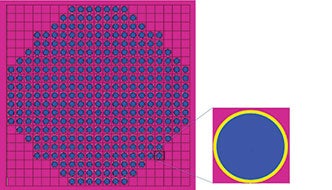Nuclear safety expert Peter Caracappa has received an $800,000 grant from the Department of Energy (DOE) to conduct benchmark experiments that could help shed new light on how nuclear reactors behave, especially under accident conditions. This new information could lead to improvements in nuclear power plant design.
The grant is one of two awarded to Department of Mechanical, Aerospace, and Nuclear Engineering (MANE) faculty under the DOE’s Nuclear Energy Advanced Modeling and Simulation (NEAMS) program. Associate Professor Jie Lian received $800,000 to support his research on the fracture behavior of fuel pellets.

Peter Caracappa
NEAMS distributed $3 million in grants for research and development in fiscal year 2015. Of that, more than half—or $1.6 million—went to Rensselaer, the only institution to receive more than one award.
“Our ability to secure such a significant share of the NEAMS funding is yet another reflection of the quality of Rensselaer’s nuclear engineering program, the expertise of our faculty, and their innovation and leadership in this field of research,” said Shekhar Garde, dean, School of Engineering.
NEAMS is developing a simulation toolkit that uses leading-edge computational methods to accelerate the development of safer, greener, and more cost-effective nuclear power technologies. The toolkit will simulate advanced reactor system behaviors that are impossible to observe in a laboratory setting.
Caracappa, director of the Institute’s Walthousen Reactor Critical Facility (RCF), will use the low-power RCF to safely test and validate NEAMS multi-physics simulation codes that address neutronics, thermal mechanics, fluid dynamics, structural mechanics, and nuclear system responses.
“Multi-physics analysis is critically important in understanding the behavior of reactors, particularly under accident conditions,” Caracappa said. “Our data provides important input to advanced modeling and simulation codes, which are used to design new nuclear power plants.”
A MANE Department lecturer, Caracappa served as the Rensselaer radiation safety officer for nearly 10 years before being appointed RCF director. His past research has focused on assessing and managing the radiation dose received from medical sources, such as computerized tomography (CT) scans. He has authored or co-authored over 20 peer-reviewed publications and more than 75 conference abstracts on a variety of topics.
A certified health physicist, Caracappa was recognized with the Health Physics Society’s Elda E. Anderson Award for early career achievement in 2013. He has a bachelor’s degree in engineering physics and master’s and doctoral degrees in nuclear engineering, all from Rensselaer.


